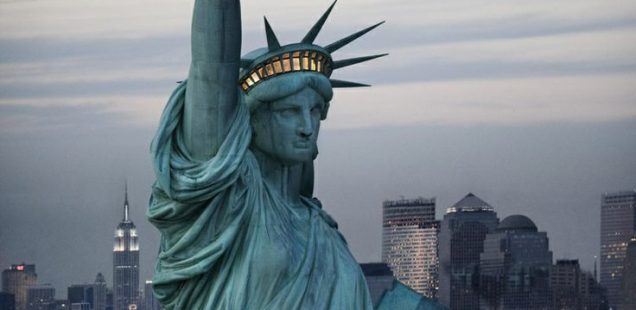
Don’t Send Her Back
Last Wednesday night at the Trump rally in Greenville, North Carolina, it became clear. The defining chant of Donald Trump’s 2020 reelection campaign is almost certainly going to be “Send her Back.” Realizing this, I found myself sinking to an even lower level of gloom. Not that it surprised me that Donald Trump could descend deeper into the inferno of his incendiary remarks. The one thing that has been consistent in the otherwise epically inconsistent Trump Administration is Donald Trump’s unfailing ability to say or do something worse than he said or did the week before.
This new low, however, especially depressed me.
Whereas the “Lock her up” chant was directed solely at Hilary Clinton and could not easily be applied to anyone else, the “Send her Back” variant, initially directed at Rep. Omar (and three Congresswomen who are American-born), can be applied to multitudes. From the outspoken Congresswoman from Minnesota, it will be an easy slide into targeting any refugee or immigrant, anyone who looks or sounds like they might be from somewhere else, or, sadly, any person of color.
And the targeting has already begun. A day after the Trump rally, a gas station attendant in Naperville, IL was fired for telling Hispanic customers “to go back to their country.” It will get worse. Much worse. A lot of people are feeling enabled.
Already at the dawn of the American experiment, the seed of discontent was sown. From the very first immigrants to reach our shores, there was fear and distrust of those who came after. Read Nathanial Hawthorne’s The Maypole of Merry Mount about the tensions between the first English immigrants, the Puritans, and the English who followed them a few years later. The Puritans were not happy with the new arrivals. They were not as God-fearing as the Puritans felt they should be. They seemed to believe in enjoying life. They danced around maypoles.
Then came the Germans who the English didn’t like. Then the Irish, the Italians, the Chinese, the Eastern Europeans and the Eastern European Jews. All these groups, it was grimly predicted at the time of their arrival, with their lack of education, their Catholicism, their Jewishness, their swarthiness, their otherness, would bring down the Anglo-Saxon nation. Yet, they didn’t bring it down, did they? They built it up: its railroads, bridges, roads, and skyscrapers, its diversity and cultural capital. Tragically, descendants of some of these very same vilified immigrant groups stand today at Trump rallies, shouting for the next wave of desperate people to go back or go home.
The dark underbelly of American immigration. There have been presidents who fed it before, but no president who feeds it as shamelessly as Donald Trump.
Yet let it be known for my readers outside the United States, in Canada and Germany, in Russia, France, Switzerland, Great Britain, Sweden, New Zealand and Australia, that there is another tradition in America, the one people grow dewy-eyed over and of which many tales are told. This is the tradition of welcoming new arrivals, of lending them a hand and helping where you can. This tradition has always existed side-by-side with the epithets thrown at the nearly-arrived. It has always been spontaneous and heart-felt. It has always been strong and it remains strong today.
On the Monday before Trump’s rally in North Carolina, the day he started the “Send her Back” fire storm with his morning tweet, I attended a different sort of meeting. It wasn’t raucous. It wasn’t seething with resentment and anger. Nobody was looking for anyone to blame.
About twenty-five people sat around a table in a church hall. A fan oscillated back-and-forth in a corner, not entirely successful in keeping us cool. The door to the main street of the town was open and you could hear the evening’s traffic on the road outside. The group in the church hall was sponsoring a refugee family from Afghanistan. They would arrive a week that Wednesday.
At the meeting, no one talked about the Trump tweet of the morning. We had better things to do. We were busy going around the table, each person or persons reporting on what they were responsible for organizing. The people who were going to the airport to meet the family discussed when they should leave. The team who would teach them English reported that everything in their new apartment was labeled in English and Farsi. The apartment team confirmed that the apartment was ready, furnished with donated items as well as furniture bought with monetary donations. An appointment at DSS had been made so the family could get their Social Security cards. Medical appointments were on the calendar for physicals and inoculations. Clothing had been bought and a set of new clothes set aside for each boy for the upcoming holiday of Eid.
The family the group had sponsored before this one, a Kurdish immigrant family from Syria, would cook the new family dinner on the night of their arrival. Interpreters had been arranged. One of the young boys would be turning nine five days after the family arrived. We were all asked to send cards and a birthday party had been scheduled.
Looking around the table, I did not see Republicans or Democrats. I did not see discontent or blame. I saw a group of volunteers, mostly older, mostly white, calm and determined, focused on a common purpose. I saw patriots, if I may be so bold, the quiet ones, the ones who never make the evening news.
This, too, is America, I would like to reassure my readers from abroad, and those Americans starting to despair. It’s quiet. It’s not shouting. It’s welcoming the people who have had a hard time of it and are making the leap of faith to start again in another land.
At the beginning and end of each meeting, someone usually reads something. It can be religious or not. It is supposed to be inspirational.
“You’re probably all familiar with this,” the woman who read last Monday night murmured.
“Give me your
tired, your poor,
Your huddled masses yearning
to breathe free,
The wretched refuse of your
teeming shore.
Send these, the homeless,
tempest-tossed to me,
I lift my lamp beside the
golden door!”
I have no doubt Donald Trump will go on tweeting and the storm over whatever he tweets will rage. I have no doubt there will be more rallies, more people shouting “Send her Back,” and more incidents when angry citizens will vent and possibly even hurt new arrivals. But I also know that this Wednesday morning, two cars will set out from Connecticut to drive down to Kennedy to meet the morning flight from Istanbul. They will bear banners of welcome in a language the drivers of these cars do not speak and cannot understand. In one of the cars there will be an interpreter who will explain to the family who the greeters are and where the family will be going. Everyone will be nervous and their hearts will be full of emotions they may not fully understand. The greeters will be wondering if they are greeting the family in the right way, if they are putting them at ease. The family will be exhausted, but also hopeful that the traumas of war and refugee camps are now behind them.
Everyone will smile. No one will shout. The arrival will not be televised.





Linda,
Your essay brought tears to my eyes. The helpers are true patriots and beautiful messengers of what it means to live the Statue of Liberty’s message.
Thank you for sharing…Lenore
Thanks Lenore.
Brilliant writing, Linda! And to your readers from other countries: Americans turn a deaf ear to the bombastic rants of Mr. Trump ,and instead show humanity in the midst of a crumbling democracy. American men and women who choose to live and work for the greater good of mankind are the “ everyday leaders” who quietly steer our mothership into the harbor that once welcomed immigrant ancestors home.
Dear Linda, I have been asked to deliver a sermon at my local church in Auckland (New Zealand). It is terrifying me. But what you have written has so many parallels with issues we are grappling here that I have just spent 20 mins scribbling, sparking with ideas. We have lots of of Americans in our congregation, who describe themselves alternatively as “Bush refugees” or “Trump refugees” depending their date of immigration to NZ, so they will be able to relate to your themes too. Thank you for the inspiration!
My pleasure, Nina!
Linda,
I needed to hear this. It has been conflicting to sift through the frightening reality of our American condition. This should be read by many.
Thank you for posting.
Jen
Beautiful, as always, Linda. This brought a warmth to my heart and and a smile to my face. I wish you would send this to the NY Times!!!!!
Linda, this is beautiful. As someone else said, I needed to hear this. Thank you for writing it and for being one of the many patriots people don’t hear about.
Janis
Linda, wonderful article especially about the people who are working behind the scenes in welcoming new immigrants to our country – we should welcome them with open arms. Could you send me via e-mail any information on how people can donate clothing and furniture or other ways to assist with the Waterbury group that is helping immigrants settle in this county? I would love to help.
2020 is around the corner and ‘Teflon’ don seems to be able to lie, cheat, make incendiary racist, homophobic, demeaning remarks and it doesn’t seem to stop his base and if anything some voters not in ‘his base’ are starting to support him. As unbelievable as that may sound.
He cannot be reelected and do any more damage to our country. Today July 23, 2019 The Trump administration put into effect a law that would rein in states’ ability to enroll recipients earning more than 130% of the federal poverty guidelines — in most cases capping eligibility to an annual income of $32,640 for a family of four.” The law affects over 3M people. The Poverty rate is 25,750. The 32,640 equal 125.54 for a family of four a week – which comes to a family of four living on 18 dollars a day. To me this is criminal. Article – Trump Administration Moves to End Food Stamps for 3 Million People by Mike Dorning Bloomberg July 23, 2019, https://www.bloomberg.com/news/articles/2019-07-23/trump-administration-moves-to-end-food-stamps-for-3-million
Keep up the good work
Sharon
Sharon,
Checks or gift card donations can be sent to St. Paul’s Church, P.O. Box 5002, Woodbury, CT 06798. Make sure you state that it is for NEW START MINISTRY. This is the name of the immigrant sponsorship initiative. And thanks for wanting to donate!
They are not taking in-kind donations at this time, but might be again soon!
Hi Linda, your blog brought forth beautiful emotions and hope for our nation. I’m sharing it in tribute to you hoping those who read it realize what living in this country truly is all about
Thank you. As I write this, the email has just been sent out confirming that the family is at the airport in Istanbul cleared to come and begin their new life in the United States.
Beautiful Linda. Thank you. Literally brought tears to my eyes.
Thanks for that pick-me-up.